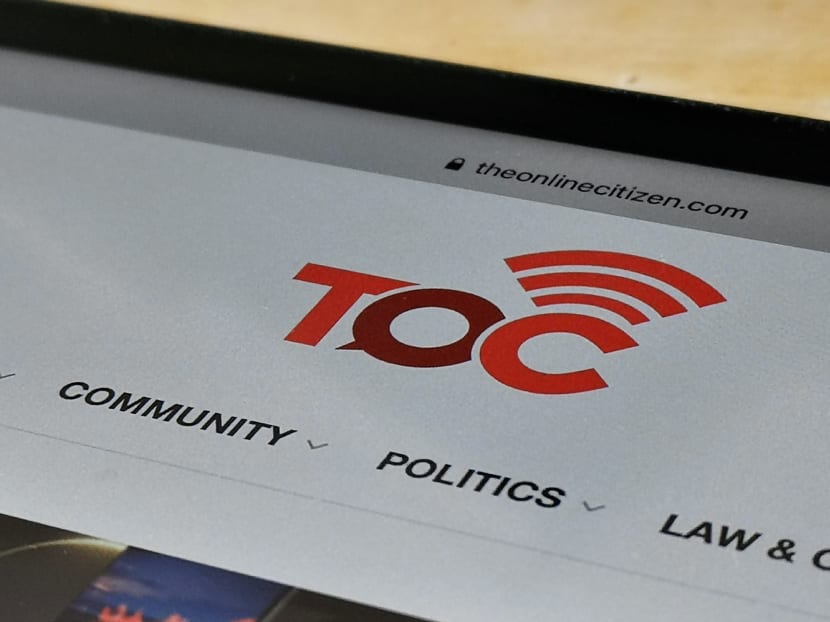IMDA warns of enforcement against TOC if it can’t give ‘good reasons’ for not declaring funding sources
SINGAPORE — The Infocomm Media Development Authority (IMDA) could take enforcement action against The Online Citizen (TOC) if the socio-political website cannot provide good reasons for repeatedly failing to declare all its funding sources in its yearly declaration.

The Infocomm Media Development Authority said that The Online Citizen “repeatedly failed” to declare all its funding sources for its 2020 declaration, despite the many reminders and extensions it had been given.
- The Online Citizen (TOC) could face enforcement action from IMDA for not declaring its funding sources
- The declaration is to prevent online sites from falling under foreign influence, IMDA said
- TOC has told IMDA that it does not plan to comply with its obligations under the law, the authority said
- Mr Terry Xu, the website’s chief editor, said IMDA had suddenly asked it to justify its subscription process
SINGAPORE — The Infocomm Media Development Authority (IMDA) could take enforcement action against The Online Citizen (TOC) if the socio-political website cannot provide good reasons for repeatedly failing to declare all its funding sources in its yearly declaration.
The declaration of funding sources is to prevent online sites from falling under foreign influence.
IMDA, which regulates internet content providers, said on Tuesday (Sept 7) that TOC had “repeatedly failed” to declare all its funding sources for its 2020 declaration, despite the many reminders and extensions it had been given.
“TOC has informed IMDA that it does not intend to comply with its obligations under the law,” the authority said in response to media queries. “IMDA has therefore asked TOC to explain its non-compliance.”
It added: “If TOC is unable to provide good reasons for its non-compliance, IMDA may take appropriate enforcement action.”
There was no reason for TOC not to fulfil the obligation, IMDA said, since other registered internet content providers provide this information so as to be transparent about their sources of funding.
“This is to prevent such sites from being controlled by, or coming under the influence of, foreign entities or funding, and ensure that there is no foreign influence in domestic politics,” IMDA said.
When contacted by TODAY, TOC’s chief editor Terry Xu said that the website was suddenly asked to justify its subscription model.
Mr Xu said: “TOC had declared its funding source since it was asked to register under the licensing regime in 2018.
"It was in 2020 when IMDA suddenly asked TOC to justify its subscription model."
TOC had already prepared the documents for the declaration and asked for the subscription portion to be exempted, but IMDA rejected the request. TOC thus could not proceed with submitting the declaration, he explained.
"(IMDA) has no justification to scrutinise the subscription in the manner it is doing.”
Mr Xu added that TOC adopted its subscription model since at least 2014, and that subscribers receive a newsletter and no longer get advertisements when they access the site.
In response to this, a spokesperson for IMDA told TODAY that while subscriptions are allowed, they “should not be used as a loophole for foreign funding”.
“That is why IMDA requires full transparency as to how TOC derives its subscription revenue,” the spokesperson said.
In its statement, IMDA said that TOC had complied with the yearly declaration when it first registered in 2018.
Since 2019, however, it has not fully adhered to it.
For instance, in its 2019 declaration, TOC failed to verify a donor and to clarify discrepancies in its foreign advertising revenue, and was issued a warning by IMDA in May this year.
Responding to this, Mr Xu said that in its 2019 declaration, TOC was unable to verify the donor because it could not provide the donor’s National Registration Identity Card number.
He noted, however, that TOC was able to provide the donor’s name.
As for the discrepancy in its foreign advertising revenue, Mr Xu said that there was an error in tabulating the figures and that there was no intention to conceal any discrepancy.
“Publications that are really supported by foreign entities need not worry about IMDA's licensing regime, as (they) can easily park the funds under bona fide advertising agreements,” he said.
IMDA said that the threat of foreign interference in Singapore’s politics has “always been present”.
For instance, the country was a target of two operations in the 1970s involving newspapers The Eastern Sun and the Singapore Herald.
“These newspapers received funding from foreign sources and ran articles that sought to undermine Singapore’s nation-building efforts,” IMDA said.
It added that there have also been reports from other countries that foreign players and their agents had tried to influence their politics by buying off political parties and politicians.
“We need to be cautious, as the prevalence of the internet and social media platforms makes it easier to influence large numbers of people.”











